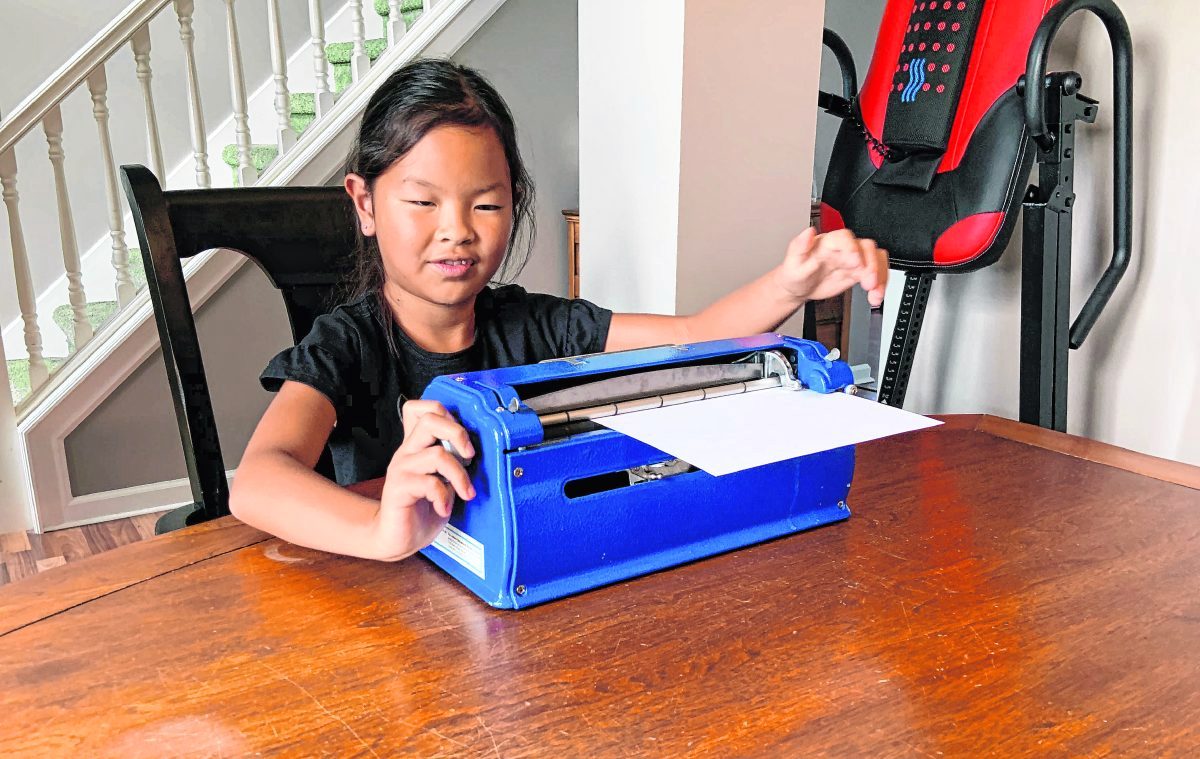
<p><strong><em>A</em></strong> competition of this magnitude required some brain food.</p><p>Over four grueling hours, Emma Stamper answered question after question testing her reading comprehension, spelling and overall mastery of braille. The 8-year-old Edinburgh resident had to spell a list of increasingly difficult words, read a passage and then answer questions about it, and proofread a series of sentences, searching for and correcting the errors.</p><p>Breaks were limited. But when she could stop, she popped a few pieces of sushi for quick energy.</p>[sc:text-divider text-divider-title="Story continues below gallery" ]Click here to purchase photos from this gallery<p>“I ate all of it before the test was over. Every now and then we’d take a break, and I’d eat a piece. It helped me,” she said.</p><p>The strategy worked — on top of all of her hard work and practice, of course. Emma won first place in her age group at the Braille Challenge, a national competition testing the individuals on reading and writing braille. She also took home the Excellence in Spelling award over all age groups.</p><p>Emma’s success was exciting for her and her family — parents Tina and Brad Stamper, and her 4-year-old brother James — though hardly a shock to those who have worked closely with her.</p><p>“She’s a very precise person. On one hand, you’re surprised whenever someone does something like this, but at the same time, it’s not surprising,” said Marya Zipoff, the blind/low vision teacher at Earlywood Education Center who works with Emma. “She’s such a young girl, for her to do so well is amazing.”</p><p>The Braille Challenge is the only academic competition of its kind in North America for students who are blind or visually impaired. Developed by the nonprofit Braille Institute, the competition is designed to motivate students to practice and hone their braille literacy skills, which are essential to academic and employment success.</p><p>Any blind or visually impaired student in grades 1 to 12 who can read and write braille is eligible to participate in the challenge. Contestants are divided into five categories based on grade level, then tested on fundamental braille skills such as reading comprehension, spelling, speed and accuracy, proofreading, and charts and graphs.</p><p>More than 1,100 students in the U.S. and Canada compete in state or regional contests, then the top 50 scores across the country are invited to the national Braille Challenge.</p><p>When Emma learned about the challenge, it was something she wanted to be a part of.</p><p>“I thought (the Braille Challenge) would make me a better reader and a better braille writer,” she said.</p><p>Emma has been blind since she was a young child. She had just turned 3 years old when doctors diagnosed her with a rare childhood cancer of the eyes called a retinoblastoma. Her doctor gave the family a 50/50 chance that she would live to her fifth birthday, Tina Stamper said.</p><p>But through intense treatment, Emma was able to overcome the disease. Unfortunately, he tumors that were growing in her eyes caused her retinas to detach, leaving her completely blind.</p><p>As Emma’s vision dissipated, Tina and Brad Stamper felt it was important for her to start learning braille.</p><p>“We felt it was important for Emma to learn braille, as it is the key to her literacy. Braille is the way that Emma reads, writes, and completes math problems,” Tina Stamper said. “One day, it will provide her with the means of earning a college degree and gaining meaningful employment.”</p><p>Over the past five years, Emma has gradually built her skills by constant practice, as well as a passion for reading. Her favorites include the Biscuit series and books such as the Fancy Nancy series.</p><p>“We are very proud of Emma for her hard work in learning braille. It hasn’t always come easy for her, but she has been determined,” Tina Stamper said.</p><p>Reading books was her primary way of preparing for the Braille Challenge.</p><p>“When I wasn’t reading a book, which is what I should be doing when I practice, Mom would say, ‘Emma, I’d go get a book if I were you.’ So I’d run up and get a book, since I have a whole bookshelf of them,” she said.</p><p>In a normal year, everyone would travel to Los Angeles for the contest. That was where Emma and her family went last year, when she finished in the top 10 of her age group of first and second graders to qualify for the national competition.</p><p>She did not win, and that only motivated her more.</p><p>“I thought I could do it this time,” Emma said.</p><p>In response to the COVID-19 pandemic, organizers of the Braille Challenge opted for a virtual contest instead of in person. On June, Emma and her parents met at Southwestern Elementary School in Shelby County, where Emma is a student. They were joined by her braille teachers, Marya Zipoff and Judy Van Nes, as well as her principal, Josh Edwards, who cheered her on.</p><p>Section by section, she completed the challenge.</p><p>“I was nervous. But I just kept going, and forgot all about that during the test,” she said. “When it was done, I thought that I’d win.”</p><p>Despite her confidence, Emma had to wait to learn what her results were. Winners of the Braille Challenge weren’t released until July 31, during a virtual ceremony. As organizers read off the names of each age group’s winners, Emma heard hers called.</p><p>But to win the Excellence in Spelling award — the top speller of any age group — was a surprise.</p><p>“Everybody was pretty much screaming. I was the loudest one,” Emma said.</p><p>This is the last year that Emma will compete in the Apprentice division of the Braille Challenge. Next year, she’d join other third and fourth graders in the Freshman category. She plans to increase her practice, with her aim being another victory in 2021.</p><p>“I’ll have to do two more tests than I did this time, so it’ll probably be a longer test,” she said. “So I’ll have to bring more sushi.”</p>




